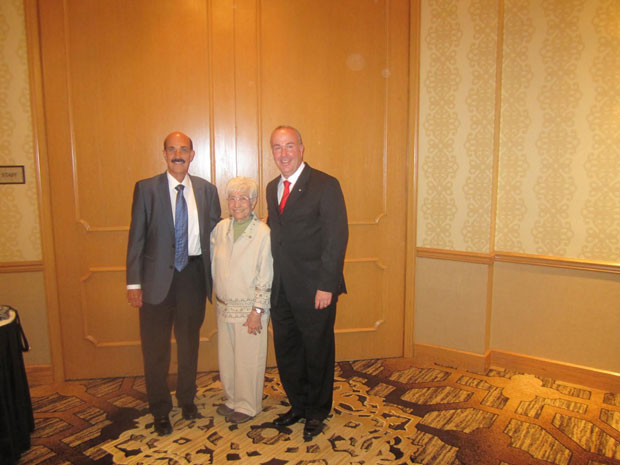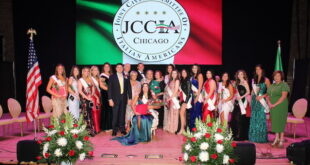by Ron Gruendl
During the opening luncheon at the ISDA Convention in Chicago this summer, Hilton Worldwide executive Robert Allegrini opened his remarks by noting his first ISDA convention was held in Pittsburgh back in the late 1980s. “I never thought that a quarter century later, I would be addressing you as a keynote speaker,” he quipped.
Allegrini said that his remarks would focus on evangelism “in the noble cause of promoting, preserving and protecting the Italian American culture and heritage.” When visiting the Coliseum in Rome at 10 years of age, his father dug a small stone from a wall and gave it to his son and said “hold on to this stone because it represents the Roman heritage that flows through your veins.”
Still in his possession, that pebble served as a catalyst to really awaken his interest and appreciation of all things Italian which has continued to grow unabated. Considering himself “a professional Italian,” Allegrini eventually studied at the University for Foreigners in Perugia and the University of Florence.
“I am going to share with you my unvarnished thoughts on what it means to be Italian-American in 2014, both the good and the bad, in hopes to persuade you to evangelize the cause of our true culture with a new found stridency,” Allegrini said. “My world view is quite simple: I believe that the world would be a better place if only it were a bit more Italian.”
Noting every ethnic group has made very valuable contributions to this country, he believes we would all be living better if only we lived more as Italians. Explaining that Italians displayed “a continuum of incomparable humanity,” Allegrini pointed out that Italy built its expansive empire based not on enslavement, but on inclusion through a culture that is “tolerant, accepting and broadminded.”
Allegrini said the current generation of Italian-Americans have not lived up to the legacy of its ancestors. “As an ethnic group, we’ve done a woeful job of living up to our heritage,” he exclaimed.
The reasons he counted out included that many have done a “lousy job” of educating their children on what it fully means to be Italian-American or to have a connection to “our mother language.” Allegrini said today’s youth do know about food. “They know that Italian-American families get together to eat a big meal with pasta on Sunday and that their grand others are good cooks. I am here today to tell you that simply isn’t enough,” he said.
Sadly, he stated “the void in knowing about our true culture and history is being filled by a Hollywood that is bent on portraying us as buffoons and criminals.” Allegrini said in a recent survey of fifth grade students, when asked what word comes to mind when they think about Italians, the answer was not art or music or even food, it was the Mafia. “Far too many of our own children take a perverse pride in the images they see in films like Good Fellows and TV series like The Sopranos.”
He also discussed the statistics from a study of sound films from 1928 to 2002, the 1,233 films produced in this country related to Italian-Americans had 70 percent of them portraying Italians in a negative light. Allegrini said 40 percent of the portrayals were of mob characters and 30% were of “boors, buffoons, bigots or bimbos.”
“This constant portrayal of Italians as mobsters has caused the media to suspect any Italian of having criminal associations, and this has had a terrible effect on Italian-American politicians and on Italian-Americans trying to climb the corporate ladder. Anyone who doesn’t believe this is simply deluding themselves,” he said.
Allegrini told the story of a Hilton Chicago guest asking for hotel directions in the hotel and asked him about the rosette he was wearing in his jacket lapel. Explaining it had been bestowed on him by the Italian government, she said, “Oh, did you get it from the Mafia!”
“I am so tired of being told that I am too sensitive on this issue, as I am simply too proud because I truly know Italian history and I know about the incomparable Italian culture,” he explained. “The prospects for continuing our culture with our next generation are bleak at best.”
Allegrini called upon conventioneers to “spreading the gospel of Italian-American culture by following these 10 suggestions:
1) Learn Italian history. “You can’t espouse and promote the full richness of the Italian culture unless you know the incomparable achievement of Italy and of Italians over the course of more than 2000 years.”
2) Teach that Italian history to your children and grandchildren, and teach your daughters and granddaughters that there is more to Italian-American life than the kitchen. “There is nothing wrong with passing on our fabulous culinary traditions, but it is only one aspect of a very multifaceted culture.”
3) Actively encourage your children and grandchildren to learn Italian.
4) Contribute and donate to Italian-American causes.
5) Cooperate with other Italian-American organizations. “In unity there is truly strength (and) I would like to see you work with the National Italian American Foundation. There is no reason that there should not be a formal affiliation between the ISDA and NIAF, where all your members would be accorded membership in the Foundation as well.”
6) Fight the negative stereotyping of Italians and Italian-Americans. “This might be the most difficult because it means being confrontational, but to be confrontational in defense of your heritage is a badge of honor.”
7) Travel to Italy with your family, seek out distant relatives who are still there and establish a link with them.
8) Stay current with what is happening in Italy, which remains a dynamic country, a force for good in the world and a strident ally of the U.S.
9) Promote everything Italian and Italian-American with passion and persistence. “Wear your heritage on your sleeve and revel in your Italian-ness. Never pass up an opportunity to glorify Italy and Italian-Americans to your family, your friends or even to strangers.”
10) Live like an Italian by leading by example. “Live with the style, grace and inherent intelligence that are the hallmarks of our people and let the rest of the country observe what real Italian-Americans are like.”
Allegrini ended by proudly claiming his belief in “Italian exceptionalism,” and adding that other Italian-American evangelists who follow these suggestions can effect positive change by touting our ancestors. “When we do this, we will truly be worthy of our magnificent heritage,” he concluded.
Robert Allegrini is a hospitality executive, author and civic leader who currently serves as Vice President of Communications-the Americas, Hilton Worldwide. In this capacity Allegrini manages the public relations team serving all the corporately-managed Hilton properties throughout the Western hemisphere. He previously oversaw public relations for Conrad Hotels & Resorts and Waldorf Astoria Hotels & Resorts worldwide and served as Regional Communications Director for Hilton’s central division. He has worked extensively in the hospitality industry in Asia, Europe and the East Coast of the United States in addition to his native Chicago.
He has long been active in Italian-American affairs on a local and national level. From 1987 to 1990, Allegrini served as Executive Director of the Joint Civic Committee of Italian Americans – an umbrella association of over 70 Illinois-based Italian American Associations. Subsequently, he founded the Chicago chapter of the Academia Italiana Della Cucina and served for three years as President of the Italian American Chamber of Commerce of the Midwest. Currently, Allegrini serves as Midwest Regional Vice President of the National Italian American Foundation and is also a board member of the Italian American Human Relations Foundation.
His services to the Italian-American community have been recognized both by Italy’s former royal family, the House of Savoy, which made him a Cavaliere (Knight) in 1991, and by the Republic of Italy, which made him a Commendatore (Knight Commander) in the Order of Merit in 2002.
A graduate of Northern Illinois University where he won the Dean’s Award in Political Science, he later won a graduate fellowship to study Foreign Affairs at the University of Florence in Italy. Allegrini is married to the former Cristina Bomben and they have two sons, Alessandro and Marco.
 Fra Noi Embrace Your Inner Italian
Fra Noi Embrace Your Inner Italian







